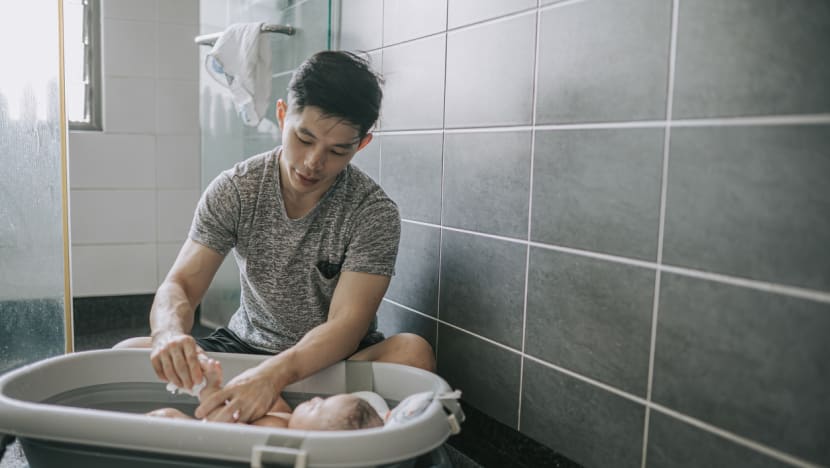Commentary: It’s time for dads to rise up
Fathers are often seen as mums’ assistants in caring for children. Help us do more, says Dr Xander Ong, CEO at Centre for Fathering.

File photo. While traditional parenting roles once dictated that mothers are the primary caregivers, there is a growing recognition of the essential role fathers play in child-raising. (Photo: iStock/Edwin Tan)

This audio is generated by an AI tool.
SINGAPORE: My son was born last year. I struggled during the early days; my arms, back and shoulders ached from frequently carrying him during naptime. Over time, as I grew daddy muscles and bonded with him, I would look forward to our morning walks, and other times with him held to my chest or back in a baby carrier specially bought for “daddy time”.
Today’s fathers are more involved than ever. While traditional parenting roles once dictated mothers as the primary caregivers, there is a growing recognition of the essential role fathers play in child-raising.
In the last Marriage and Parenthood Survey, the proportion of those who felt that mothers should ideally take care of their children full-time fell to 24 per cent in 2021 from 40 per cent in 2016 for single respondents, and to 40 per cent from 56 per cent in 2016 for married respondents.
This shows that fathers can, and want to, play a greater role at home.
MORE SUPPORT NEEDED FOR WORKING FATHERS
However, official statistics show that only 53 per cent of eligible fathers in 2021 took government-paid paternity leave.
Paternity leave has been doubled to four weeks from this year, although the additional two weeks is currently still voluntary for employers. It is anyone’s guess what percentage of new fathers will fully utilise their paternity leave this year. What is certain though is that it’s not just up to dad and mum, but also employers, public policies and society-at-large to help men be the best fathers they can be to their children.
A greater shift in workplace culture is needed. Through the years, workplaces have become more empathetic and accommodating towards working mothers, offering amenities such as lactation rooms and flexible working hours or jobs. That’s a great thing, but what about accommodations for fathers?
Through my interactions with stakeholders, I’ve been told that some fathers who request for work flexibility encounter hurdles such as gender stereotyping and threatened career progression. I’ve also been told that some fathers had to consider a job change due to misalignment of values with their employers, or job demands that make being an involved parent unsustainable.
To support working mums and dads, workplaces should be open to various flexible working arrangements for both men and women. Management needs to lead by example so that staff are encouraged to make their families a priority.
For many companies, this might entail restructuring roles, enhancing processes, introducing digital solutions, or adding manpower. While this can be costly, businesses must consider longer-term returns such as in talent attraction and retention, and building a value-based business that employees and customers appreciate.
The additional two weeks of government-paid paternity leave is a good start and is well-intended to encourage fathers to be more involved with their newborns. However, the employer’s choice in whether employees receive this benefit surfaces the challenges fathers face in utilising parental leave.
Unlike medical or childcare leave entitlements, the employer determines whether to offer the additional paternity leave. In a CNA article last month, several companies expressed reservations on a blanket implementation of extra paternity leave, citing the need to balance the employee benefit with business considerations.
FATHER-FRIENDLY PROGRAMMES
Beyond policies such as paternity leave and flexible work arrangements, a family-friendly work culture actively promotes and encourages the strengthening of families.
Companies can organise workshops and father-child bonding activities where dads can support each other and journey together. The Centre for Fathering has various programmes such as Back to School with Dad, where fathers are encouraged to accompany their children to school at the start of the new school year. There is also the Eat With Your Family Day initiative, which encourage companies to allow employees to leave work early on the last Friday of each school term.
As a society, we are still biased towards mothers as primary caregiver and fathers as assistants - a perception that needs to be changed.
Mr Edwin Choy, co-founder of Centre for Fathering, once said during a media interview “When the wife prepares for the birth, the husband prepares to be a father”.
While we usually provide training for a new employee before and when he takes on an unfamiliar role, we often neglect the need to equip new fathers with the skills to be good parents.
A review of parenting programmes for men in the United States showed that father-inclusive perinatal literature was poor. Out of a total of 1,353 studies reviewed, only 19 were considered “father-friendly”, according to the review published in the American Academy of Pediatrics.
Similarly in Singapore, most existing programmes are designed primarily for mothers. How does this lack of support for fathers contribute to imbalances in parenting responsibilities within families, and what steps can be taken to address this?
Research has found that fathers who are involved during pregnancy tend to stay involved over the long term. Pre-natal courses need to be re-designed to proactively include fathers and provide relevant and specific components for them. For example, fathers can be equipped with parenting skills such as skin-to-skin care and awareness of how their active involvement will bring about benefits for the child.
Fathers can learn how to support their wives through the various physical, physiological, and psychological changes before and after pregnancy. Healthcare and social service journeys can also be designed to include and encourage fathers to be more active in their roles.
IT TAKES A CHILD TO RAISE A VILLAGE
An involved father brings wide-ranging and long-term social, behavioural and psychological benefits to the child.
While many have heard of the saying that it takes a village to raise a child. I have recently subscribed to the narrative championed by Care Corner Singapore’s Circle of Care - “It takes a child to raise a village”.
Fathers must rise up not just as individuals but as a collective. In recent years, many groups have been formed to meet the diverse needs of fathers, including single, divorced, stay-at-home dads and fathers of children with special needs.
When fathers support each other, share their experiences, offer advice and provide emotional support, they feel more confident and are better equipped to handle the unique challenges that come with fathering.
Fathers need the support of government, organisations and community groups to collaboratively build a Singapore that is truly made for families.
Dr Xander Ong is CEO at Centre for Fathering and champion of the DADs for Life and MUMs for Life movements.




















